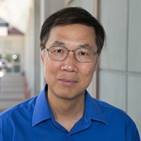各位老师,各位同学:
以下是一则学术报告信息,请有兴趣的老师、同学前往参加。
报告题目: Bioengineering of Direct Cellular Reprogramming
报告时间: 2017-6-12 10:00 (周一)
报告地点: 材料学院大会议室
报 告 人: Prof. Kam W Leong教授(Biomaterials主编, 美国哥伦比亚大学生物工程系教授)
联系人:屈雪
主办单位: 材料科学与工程学院生物材料中心
Bioengineering of Direct Cellular Reprogramming
Kam W Leong, Samuel Y Sheng Professor
Department of Biomedical Engineering | Department of Systems Biology
Columbia University | New York, NY 10027
kam.leong@columbia.edu
Direct cell reprogramming or transdifferentiation, where adult cells are reprogrammed from one lineage to another without going through an intermediate stem cell-like stage, produces cells promising for regenerative medicine. It obviates the use of embryos and minimizes the risk of teratoma formation associated with the in vivo application of induced pluripotent stem cells. Direct reprogramming can also produce cells for disease modeling and drug screening. I will discuss our recent effort to convert human endothelial progenitors (hEPC) into induced smooth muscle cells (iSMC), hEPC into induced skeletal myocytes (iSkM), human fibroblasts into induced cardiomyocyte-like cells (iSML), and murine fibroblasts into induced neurons (iN). I will describe various approaches of achieving direct cell reprogramming using transcription factor overexpression, microRNA delivery, molecular pathway manipulation, and CRISPR/dCas9-based transactivation either separately or in combination. This will be presented from the perspective of how biomaterials and biomedical engineering researchers can help advance this exciting field.
 Kam W. Leong is the Samuel Y. Sheng Professor of Biomedical Engineering at Columbia University. He received his PhD in Chemical Engineering from the University of Pennsylvania. After serving as a faculty in the Department of Biomedical Engineering at The Johns Hopkins School of Medicine for almost 20 years, he moved to Duke University in 2006 to study the interactions of cells with nanostructures for therapeutic applications. After moving to Columbia University in September 2014, he continues to work on nanoparticle-mediated nonviral gene delivery and immunotherapy. The lab also works on the application of nanostructured biomaterials for regenerative medicine, particularly on understanding cell-topography interactions and on the application of nonviral vectors for direct cellular reprogramming and genome editing. He has published ~330 peer-reviewed research manuscripts with >35,000 citations, and holds more than 50 issued patents. His work has been recognized by a Young Investigator Research Achievement Award of the Controlled Release Society, Distinguished Scientist Award of the International Journal of Nanomedicine, Clemson Award for Applied Research of the Society for Biomaterials, and Life Time Achievement Award of the Chinese American Society of Nanomedicine and Nanotechnology. He is the Editor-in-Chief of Biomaterials, a member of the USA National Academy of Inventors, and a member of the USA National Academy of Engineering.
Kam W. Leong is the Samuel Y. Sheng Professor of Biomedical Engineering at Columbia University. He received his PhD in Chemical Engineering from the University of Pennsylvania. After serving as a faculty in the Department of Biomedical Engineering at The Johns Hopkins School of Medicine for almost 20 years, he moved to Duke University in 2006 to study the interactions of cells with nanostructures for therapeutic applications. After moving to Columbia University in September 2014, he continues to work on nanoparticle-mediated nonviral gene delivery and immunotherapy. The lab also works on the application of nanostructured biomaterials for regenerative medicine, particularly on understanding cell-topography interactions and on the application of nonviral vectors for direct cellular reprogramming and genome editing. He has published ~330 peer-reviewed research manuscripts with >35,000 citations, and holds more than 50 issued patents. His work has been recognized by a Young Investigator Research Achievement Award of the Controlled Release Society, Distinguished Scientist Award of the International Journal of Nanomedicine, Clemson Award for Applied Research of the Society for Biomaterials, and Life Time Achievement Award of the Chinese American Society of Nanomedicine and Nanotechnology. He is the Editor-in-Chief of Biomaterials, a member of the USA National Academy of Inventors, and a member of the USA National Academy of Engineering.